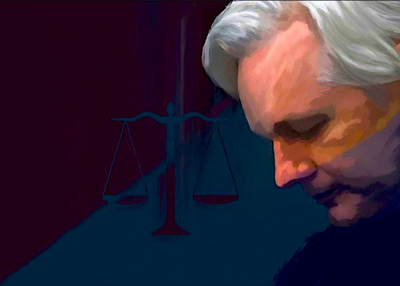US Wins Appeal over Extradition of WikiLeaks Founder Assange
Ruling, which overturns an earlier decision, means Assange may be closer to extradition from a British prison to the US.

All Global Research articles can be read in 51 languages by activating the “Translate Website” drop down menu on the top banner of our home page (Desktop version).
To receive Global Research’s Daily Newsletter (selected articles), click here.
Visit and follow us on Instagram at @crg_globalresearch.
***
The United States government has won an appeal at Britain’s High Court over the extradition of WikiLeaks founder Julian Assange.
Friday’s ruling, which overturns an earlier decision, means 50-year-old Assange may now be closer to being sent from London’s high-security Belmarsh prison to the US, where he would face spying charges over WikiLeaks’ publication of secret military documents a decade ago.
The court said that US assurances were enough to guarantee Assange would be treated humanely and directed a lower court judge to send the extradition request to the home secretary, Priti Patel, for review.
Patel, who oversees law enforcement in the United Kingdom, will make the final choice on whether to extradite Assange.
But the legal saga is far from over, with Assange’s legal team expected to contest the latest decision.
Assange’s partner, Stella Moris, said Friday’s ruling was a “grave miscarriage of justice”, and promised Assange’s legal team would “appeal this decision at the earliest possible moment”.
Assange watched the proceedings via video link, from Belmarsh prison.
Concerns for Assange’s mental health
A lower court in January this year had refused the US’s extradition request, saying that Assange’s mental health was too fragile to withstand the American judicial system.
Such concerns had been raised before. In late 2019, a group of 60 doctors from several countries wrote to Patel to express their worries for his mental and physical health, and later claimed that they had failed to receive any response.
In the January case, District Judge Vanessa Baraitser at the Old Bailey court in London said Assange was “a depressed and sometimes despairing man” who had the “intellect and determination” to circumvent any suicide prevention measures taken by prison authorities.
The US appealed, challenging that notion.
A lawyer working for the US, James Lewis, said Assange “has no history of serious and enduring mental illness” and does not meet the threshold of being so ill that he cannot resist harming himself.
High Court decision “Grave miscarriage of justice,” says Julian Assange’s fiancée after a UK court overturned an earlier decision blocking the extradition of Julian Assange to the United States #FreeAssangeNOW #AssangeCase
Link: https://t.co/xD0NDaxhHJ pic.twitter.com/IE5WLsy8Ku— WikiLeaks (@wikileaks) December 10, 2021
US authorities have told British judges that if they agree to extradite Assange, he could serve any US prison sentence he receives in his native Australia.
US prosecutors have indicted Assange on 17 espionage charges and one charge of computer misuse over WikiLeaks’ publication of thousands of leaked military and diplomatic documents.
The charges carry a maximum sentence of 175 years in prison, although Lewis said, “the longest sentence ever imposed for this offence is 63 months.”
Click here to read the full article.
*
Note to readers: Please click the share buttons above or below. Follow us on Instagram, @crg_globalresearch. Forward this article to your email lists. Crosspost on your blog site, internet forums. etc.
Featured image is from Lawyers for Assange

